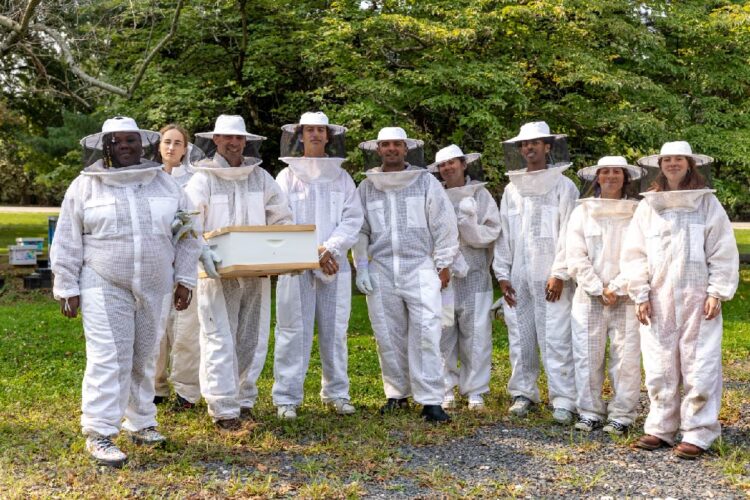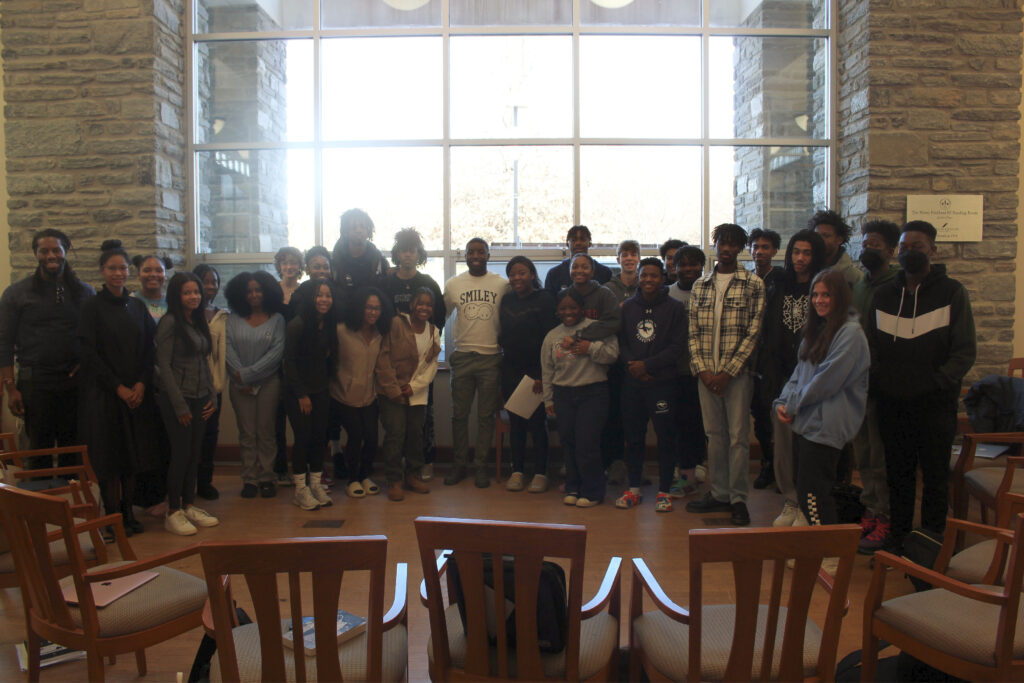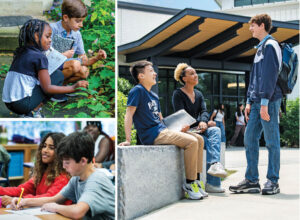It’s 8:45 on a Tuesday morning, and Noah Yoon ’24 is in band practice. Trombone in hand, he hears a buzz—but it’s not from the horn. He’s gotten a notification on his phone from Choral Director Justin Solonynka: “Come to the choral room in 10 minutes. Trust me.”
Running through the possibilities, Noah thinks of one possible explanation. “It’s gotta be a mathematical investigation.” he recalls thinking. He finishes warm-ups, puts away his trombone, and walks over to the band room. Sure enough, his Precalculus teacher Nathan Bridge is standing there, along with a room full of Upper School chamber singers, including some of his Precalculus classmates, Karishma Levy ’24.
“He’s got his MacBook propped up on a music stand as if it’s a table,” Noah recalls, “and he’s holding this weird-looking recording device in his free hand. But all I could think is, ‘Oh no, I’m making my own homework.’”
In the music room, Justin Solonynka pairs up everyone in the choral room and assigns them each a note. Two-by-two, they approach Nate’s microphone and take turns singing what was given to them. The two sounds converge into musical intervals—a major second, a perfect fifth, and then some more exciting combinations. With the recordings in hand, Nate thanks the class and departs—but Noah and Karishma know that there’s something coming up for them in class. They just don’t know what.
“During one of the next class periods, I walk in and I see a sine wave on the board—and because I’m one of the only choral singers that crossover with the precalc class, I’ve gotten a sneak peak into what this is about,” says Noah. “Nate starts class and says, ‘Okay, here’s your sine wave. It’s constructed from two musical notes. I need you to decompose this wave into the two notes. Good luck.”
Upper School Math teacher Nate Bridge structures his classroom around these investigations—a form of problem-based learning rooted in his personal pedagogical philosophy.
“When students inquire—when they investigate—they’re centering themselves in building knowledge,” explains Nate. “When they’re doing those problems, generally collaboratively with classmates, and generally in kind of an iterative sense where they can take several stabs at it—doing a rough draft, refining or getting some scaffolding questions, and trying again, they’re building their toolkit.”
Most of Nate’s class periods involve some form of investigation—like this one, the Harmonic Analysis Investigation.
“Keep in mind, we have no experience up to this point with adding or subtracting sine waves,” says Noah.
Noah’s group spent a lot of time trying to figure out the entry point to the problem—what are the important equations to use? What tools do they have in their toolkit to address the issue? After a challenging class period of trying different approaches, it seemed like none had panned out.
Meanwhile, in Karishma’s group, they had taken a slightly different approach—by smoothing out the rough edges of the sine wave, they could more easily identify its formula, and then extrapolate from that to begin to separate the two notes. But even though they got closer, they too could not finish the project by the end of the class.
But that, explains Nate, is the point.
“I don’t always expect them to get it right,” Nate explains. “When you’re investigating something that you’re not familiar with, I expect them to collaborate, test things, iterate on their ideas and above all, persevere. When you already know the answer to a question, there’s nothing really at risk. It’s like doing a science experiment that you found on Pinterest. Who cares that you got it to work?”
This is evident in the way that Noah and Karishma reflect on their project afterward. They can explain with significant nuance how to tear each sinusoidal wave apart, and how the physics of the sound wave makes the project more difficult.
Noah takes a moment to vocalize—a mid-range C. “Hearing that on its own, it sounds fine. But when you put it on a graph, it looks hideous. We’re human, not synthesizers. We can’t really hit a perfect note and sustain it over time. The wave is going to wobble, it’s going to be imperfect based on our pitch and volume—which is going to affect the frequency and amplitude—and it’s going to make the sine wave imperfect and more difficult to model.”
“It was definitely a little hard sometimes when it wiggles a little bit, but my method of madness is calling that an extreme and getting rid of it,” explains Karishma. “Those are outliers. I flatten those out and look at the sine wave—work smarter, not harder.”
So often in the math classroom, the lecture format reigns supreme. So much of the classroom experience as we remember it involves heavy textbooks, bulky graphing calculators, and a smattering of formulas on the blackboard. But what if the future of the Math classroom looks more like this—giving students the building blocks to persevere through tough applications of what they’ve learned. Some classes might include a lecture, but others might involve letting students wrestle with a challenge and struggle to find the answer. But with some encouragement, they’ll keep going and eventually uncover something new for themselves.
“It’s the question every math student asks: ‘When can I use this?’” says Karishma. “And Nate is constantly answering that question.”


